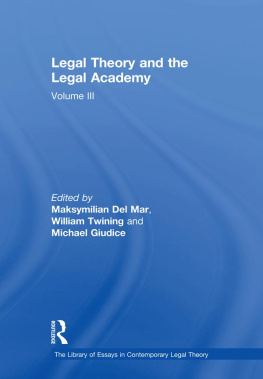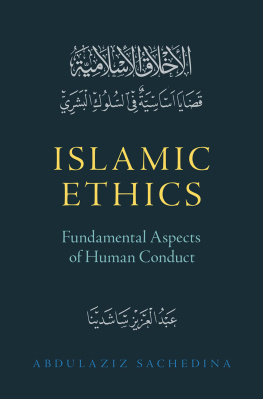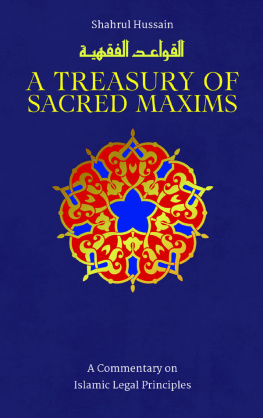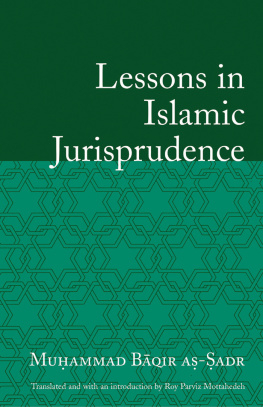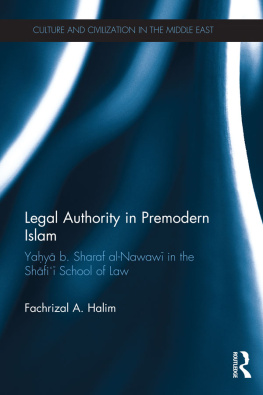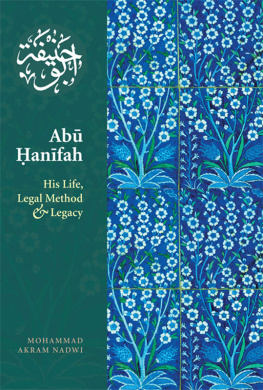THE EPISTLE ON
LEGAL THEORY
LIBRARY OF ARABIC LITERATURE
EDITORIAL BOARD
GENERAL EDITOR
Philip F. Kennedy, New York University
EXECUTIVE EDITORS
James E. Montgomery, University of Cambridge
Shawkat M. Toorawa, Cornell University
EDITORS
Julia Bray, University of Oxford
Michael Cooperson, University of California, Los Angeles
Joseph E. Lowry, University of Pennsylvania
Tahera Qutbuddin, University of Chicago
Devin J. Stewart, Emory University
MANAGING EDITOR
Chip Rossetti
DIGITAL PRODUCTION MANAGER
Stuart Brown
ASSISTANT EDITOR
Gemma Juan-Sim
LETTER FROM THE GENERAL EDITOR

The Library of Arabic Literature series offers Arabic editions and English translations of significant works of Arabic literature, with an emphasis on the seventh to nineteenth centuries. The Library of Arabic Literature thus includes texts from the pre-Islamic era to the cusp of the modern period, and encompasses a wide range of genres, including poetry, poetics, fiction, religion, philosophy, law, science, history, and historiography.
Books in the series are edited and translated by internationally recognized scholars and are published in parallel-text format with Arabic and English on facing pages, and are also made available as English-only paperbacks.
The Library encourages scholars to produce authoritative, though not necessarily critical, Arabic editions, accompanied by modern, lucid English translations. Its ultimate goal is to introduce the rich, largely untapped Arabic literary heritage to both a general audience of readers as well as to scholars and students.
The Library of Arabic Literature is supported by a grant from the New York University Abu Dhabi Institute and is published by NYU Press.
Philip F. Kennedy
General Editor, Library of Arabic Literature
ABOUT THIS PAPERBACK
This paperback edition differs in a few respects from its dual-language hardcover predecessor. Because of the compact trim size the pagination has changed, but paragraph numbering has been retained to facilitate cross-referencing with the hardcover. Material that referred to the Arabic edition has been updated to reflect the English-only format, and other material has been corrected and updated where appropriate. For information about the Arabic edition on which this English translation is based and about how the LAL Arabic text was established, readers are referred to the hardcover.
THE EPISTLE ON
LEGAL THEORY
A Translation of al-Shfis Rislah
BY
Muammad ibn Idrs al-Shfi

TRANSLATED BY
JOSEPH E. LOWRY
FOREWORD BY
KECIA ALI
VOLUME EDITOR
DEVIN J. STEWART

NEW YORK UNIVERSITY PRESS
New York and London
Copyright 2015 by New York University
All rights reserved
Library of Congress Cataloging-in-Publication Data
Shafii, Muhammad ibn Idris, 767 or 768-820, author.
[Risalah fi usul al-fiqh. English]
The epistle on legal theory / by Muhammad ibn Idris al-Shafii ; translated by Joseph E. Lowry, foreword by Kecia Ali.
p cm
Includes bibliographical references and index.
ISBN 978-1-4798-5544-5 (pb : alk. paper) ISBN 978-1-4798-3536-2 (ebook)
ISBN 978-1-4798-0902-8 (ebook)
1. Islamic lawInterpretation and constructionEarly works to 1800. 2. ShafiitesEarly works to 1800. I. Lowry, Joseph E. (Joseph Edmund), translator. II. Title.
KBP440.62.S53A3713 2015
340.5601dc23 2015023279
New York University Press books are printed on acid-free paper, and their binding materials are chosen for strength and durability.
Series design and composition by Nicole Hayward
Typeset in Adobe Text
Manufactured in the United States of America
10 9 8 7 6 5 4 3 2 1
CONTENTS
FOREWORD
KECIA ALI
Every few semesters, I teach a class on Islamic law. My students are mostly undergraduates majoring in International Relations or studying the Middle East. They want to learn about jihad, about terrorism, about family law, and about the plight of Muslim women. Some are curious about creeping shariah law and the threat it purportedly poses to American democracy.
They are surprised when I begin with ritual purity.
We devote one session to an in-class exercise on ablution, the ritual washing before prayer. Together, we read the Qurans two brief passages on the topic which, they quickly conclude, provide insufficient guidance on exactly how to wash. I then distribute an eight-page handout with selected hadith-reports of the Prophet Muammads practice. These relate how Muammad washed before prayer and also the advice he gave to others about washing. I divide the students into small groups and charge each with answering a specific question: for instance, how many times does one wash ones face? There are so many reports, some of them contradictory, that students decide that they now have too much information. Last, we turn to a medieval legal manual that explains in precise detail how to perform ablution. It tells how many face-washings are required and how many are optional. The students are always a bit baffled: how did this scholar get from the Qurans vague commands and the many competing accounts in the hadith-reports to specific rules? How, from a profusion of possibilities, did he arrive at categories like obligatory and recommended? The answer, it turns out, is legal theory.
One might also say, just as accurately, that the answer is al-Shfi.
Al-Shfi was born a century and a half after Muammad died. He never questioned that Muslims were obligated to follow Gods revealed law. He devoted his life to the quest to determine how best to do so. He memorized the Quran, as all scholars did. He studied Prophetic Practice by learning hadith-reports, though he was not especially gifted or distinguished in that field. He moved from city to city, studying with, debating, and eventually teaching key thinkers of his era. His restless seeking was prompted by the question that stymied my students: how does one follow Gods law when the evidence is sometimes scanty or confusing? Al-Shfi found existing approaches unsatisfactory, either too dependent on individual or local preference, or too unsystematic. In conversations and debates with scholars in Arabia, Iraq, and Egypt, he refined his method for interpreting and applying divine law.
Al-Shfi believed that God revealed guidance for all human behavior in the Quran and through the exemplary practice of the Prophet Muammad. Sometimes the rules were straightforward. Sometimes, however, discerning them required the judicious application of reason. Reason was never to be preferred to an answer directly from the Quran or a Prophetic hadith-report, but it might sometimes be necessary for reconciling texts that seemed to be divergent or contradictory. Al-Shfi was particularly concerned with harmonizing the Quran and Prophetic hadith-reports to yield specific guidance for human behaviorhow many times to wash ones face while performing ablution, for example.
The Epistle on Legal Theory (al-Rislah), translated here by Joseph Lowry into lucid, fresh, and precise English, represents al-Shfis mature statement about how to resolve such methodological problems. Readers will bring to
Next page

